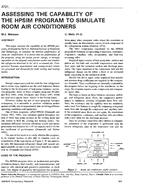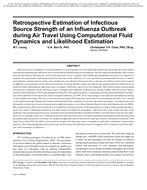A new technique for analyzing field-derived thermal performance data is described; it is incorporated in a computer program called PROPOR. This technique utilizes modern computational methods and relies on recent advances in data acquisition that make possible the accumulation of accurate data from field implanted sensors. A previous paper (Courville and Beck 1987) has shown the advantages of PROPOR over other methods for determining the thermal conductivity of insulated systems from field data. In this paper, the ability to use statistical analysis in assessing the reliability of PROPOR is discussed. The data base is temperature and heat flow information collected for expanded polystyrene (EPS) insulation in a built-up roof specimen over an eight month period. The specimen was mounted in the Roof Thermal Research Apparatus at a national laboratory. In particular, it is shown that incorporating successively more sophisticated models for the thermal conductivity of expanded polystyrene into PROPOR decreases the RMS errors between measured and calculated internal temperatures, decreases the 95 % confidence interval for the results, and randomizes the distribution of residuals, defined as the differences between measured and calculated temperatures and heat fluxes during the course of the test period. By using a temperature-dependent model for thermal conductivity having three linear segments, it is shown that the same conductivity curve is obtained for all seasons.
Units: Dual
Citation: Symposium, ASHRAE Transactions, 1988, vol. 94, pt. 2, Ottawa
Product Details
- Published:
- 1988
- Number of Pages:
- 16
- File Size:
- 1 file , 1.4 MB
- Product Code(s):
- D-OT-88-12-2


